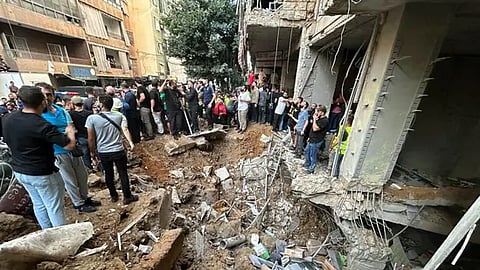
- NEWS
- the EDIT
- COMMENTARY
- BUSINESS
- LIFE
- SHOW
- ACTION
- GLOBAL GOALS
- SNAPS
- DYARYO TIRADA
- MORE

The Israeli military said Friday its air strike on Beirut’s southern suburbs eliminated Hezbollah’s Radwan Force chief Ibrahim Aqil and several other commanders.
Israel Defense Forces Chief of Staff Herzi Halevi said the Hezbollah commanders “had been planning an attack on the northern border for years.”
“We reached them, and we will reach anyone who threatens the security of Israel’s citizens,” Halevi added.
Another IDF official, spokesperson Daniel Hagari, confirmed Friday evening at a press conference the elimination of Aqil, Hezbollah’s head of operations and leader of the “Plan to Conquer the Galilee,” according to a report by The Jerusalem Post.
In a briefing, Hagari said: “The Hezbollah leaders who were eliminated were planning to carry out an operation in the north similar to that of 7 October.”
He said Aqil and the others who were eliminated had gathered underground and used civilians as human shields.
Hagari said that as part of the plan, Hezbollah intended to invade Israel, capture Galilee settlements, and kidnap and murder Israeli civilians.
“Aqil was responsible for anti-tank operations, facilitated attacks such as the one at the Megiddo Junction, attempted infiltrations into Israel and was also responsible for the organization’s attacks abroad,” Hagari said. “He was a terrorist with much blood on his hands.
Leader of Gaza raid killed too
Lebanese militant group Hezbollah said a senior commander who was among those killed in the Israeli air strike on its Beirut stronghold on 20 September was the leader of a plot to repeat the 7 October Hamas attack on Israel that killed more than 1,200 individuals.
The Iran-backed group said Ahmed Mahmud Wahbi led the military operations of its elite Radwan Force in support of Hamas when the Palestinian militant group attacked Israel, triggering the Gaza war.
A security source told Al Jazeera the strike on Friday targeted 20 senior Radwan Force commanders who were meeting underground in a parking lot. According to the report, four missiles were fired at the building under which they were meeting, and the structure collapsed.
Aqil was wanted by the United States for involvement in the 1983 bombing of the US embassy in Beirut.
The United States had offered a $7 million reward for information on Aqil, describing him as a “principal member” of an organization that claimed the 1983 embassy bombing, which killed 63 people.
Hezbollah confirmed Aqil’s death, hailing him as “one of its great leaders.”
Devices exploded
Journalists at the scene said the blast left a massive crater and gutted the lower floors of a high-rise in the Lebanese capital’s southern suburbs.
Aqil’s killing followed two waves of explosions, on Tuesday and Wednesday, of communication devices used by Hezbollah members, which Hezbollah blamed on Israel.
Those blasts killed dozens and left Hezbollah reeling while shifting the focus of the Israel-Hamas war northward.
Stephane Dujarric, spokesman for UN Secretary-General Antonio Guterres, said the body was “very concerned about the heightened escalation” and called for “maximum restraint” from all sides.
Israeli troops and Hezbollah fighters have battled each other along the Israel-Lebanon border since Hamas militants triggered the war in Gaza with their 7 October attack.
Israel’s firepower was concentrated for nearly a year on Gaza, but with Hamas much weakened, the focus of the war has moved to Israel’s northern border.
No refuge for the hunted
Israel Defense Minister Yoav Gallant said the countries’ enemies would find no refuge, “not even the Dahieh in Beirut,” a reference to the city’s southern suburbs.
Israeli military spokesman Hagari said after the strike that Israel was “not aiming for a broad escalation in the region.”
But Hamas called it a “brutal and terrorist aggression” and an “escalation.”
Iran’s foreign ministry accused Israel of seeking to “broaden the geography of the war.”
Months of near-daily border clashes have killed hundreds in Lebanon, most of them fighters, and dozens in Israel, forcing tens of thousands on both sides to flee their homes.
The latest blow to Hezbollah came after thousands of Hezbollah operatives’ pagers and walkie-talkies exploded over two days, killing 37 people and wounding thousands more.
Hezbollah chief Hassan Nasrallah vowed on Thursday that Israel would face retribution for those blasts.
Earlier Friday, Israel said Hezbollah had fired dozens of rockets from Lebanon following airstrikes that destroyed dozens of the militant group’s launchers.
Speaking to troops on Wednesday, Gallant said “Hezbollah will pay an increasing price” as Israel tries to “ensure the safe return” of its citizens to border areas.
“We are at the start of a new phase in the war,” he said.
Wider war feared
Israeli Prime Minister Benjamin Netanyahu delayed by a day his scheduled departure to the United States, where he is due to address the United Nations General Assembly.
On Friday the UN’s High Commissioner for Human Rights, Volker Turk, told the Security Council that the attack on Hezbollah communications devices violated international law and could constitute a war crime.
The pagers and walkie-talkies exploded as their users were shopping in supermarkets, walking on streets and attending funerals, plunging the country into panic.
“I am appalled by the breadth and impact of the attacks,” said Turk, adding that it “is a war crime to commit violence intended to spread terror among civilians.”
